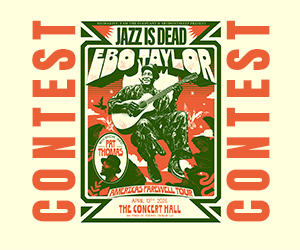CELEBRATING 25 YEARS OF STONE TEMPLE PILOTS ALBUM ‘CORE’
It was the earliest hours in the morning of December 3rd, 2015, and my world stood still. Dave Navarro broke the news which he heard via police scanner that Scott Weiland was found dead on his tour bus. Everything froze and time came to a crawl. The only thing which would not stop moving was my racing heart, the questions in my head, and the slowly dying hope that this was a hoax. It wasn’t. Just days before on December 1st, Weiland played his final show ever at Toronto’s own Adelaide Hall – a basement club that could fit probably no more than a couple hundred people. I was not only in attendance, but my band, One In The Chamber, had also opened for him. It was one of the best days of my life, getting to open for one of my musical heroes who was the voice behind a number of my all-time favourite albums. And then, less than forty-eight hours later, after a brief encounter after the show, he was gone. From Velvet Revolver to his experimental solo projects, Weiland embodied a spirit which made him one of rock’s most prolific frontmen ever and needless to say, he made his biggest mark with Stone Temple Pilots.

Emerging from San Diego in the early 1990’s, Stone Temple Pilots were a band immediately loved by fans and initially panned by critics who saw them as another would be Pearl Jam trying to jump on that rapidly growing wave of teens and disgruntled twenty-something year olds who thought grunge was a quick route to fame. Their debut album, Core, was released on September 29th, 1992, and as we celebrate the record and the band’s lasting legacy at the quarter century mark, in order to better understand the band’s place in today’s world, we must understand and accept that the legacy of Stone Temple Pilots is one tied to that of Weiland.
Core was a monumental record for the Stone Temple Pilots. It is certified eight times platinum in America alone and it spawned a series of some of the band’s biggest hits, including “Sex Type Thing”, “Wicked Garden”, “Dead And Bloated”, “Plush”, “Creep”, and the live favourite, “Crackerman”. As far as first records go, Core still stands as an incredibly strong debut and quickly launched the band into a level of stardom that was reserved for the decade’s premier rock artists. Sonically, while the album is certainly the most grunge influenced from the band’s six records, Core stands out when looking at the 90’s for how different it was in comparison to much of the grunge and alternative rock acts at the time. As a teenager of the late 2000’s, who’s adolescence featured a soundtrack of 90’s rock, I appreciated Core for the absence of angst as exemplified by Nirvana and the band’s use of song writing that was deeply connected to that of rock from the 1970’s while bringing that into the tone and textures of the 90’s. Instead of angsty, Core was moody and it gave the record a vibe that was unmatched for the time.

While the album that Core stylistically resembles the most from the time would be Pearl Jam’s 1991 debut, Ten, Stone Temple Pilots were not a grunge band. While bands like Alice In Chains, Nirvana, and Soundgarden dominated the Seattle sound with a blend of rich melodies set to a punk or metal instrumentals, and Los Angeles artists like The Red Hot Chili Peppers and Jane’s Addiction were pumping out what could be described as a renascence of alternative rock, Stone Temple Pilots carved their own identity that teetered between the two. As a result, their sound was substantially different from their peers, only borrowing certainly period or stylistic elements from the time. If Core proved anything, it was that Stone Temple Pilots were a band who shined when playing thrashing and aggressive rock & roll. “Sex Type Thing” is a relentlessly driven song lead by Eric Kretz’s pounding drums and Robert DeLeo’s bass that is filled out by the dissonance from Dean DeLeo’s guitar. Similarly, “Wicked Garden” and “Crackerman” were led by explosive grooves and crunching guitars that allowed for Weiland to not only vocally soar, but to dance around the stage like a slithery Mick Jagger, making him, still to this day, one of the most captivating frontmen I have seen.
If I were to review the album today, I would applaud the band for their ability to write a series of ballads that capture a sense of personal disparity and desolation with as much conviction as their rockers are furious. I would further praise Stone Temple Pilots for their bare and abrasive rock sound that felt refreshing in a decade where many sought to distance themselves from what was perceived to be a straightforward approach to musical expression. Still to this day, I can listen to Core on repeat without it growing old as the record, while definitely a product of the 90’s, does not feel dated, and for a debut feels quite polished, something that even some of the biggest names of the decade failed to capture on some of their earliest work. “Creep” still stands as one of the strongest ballads of the decade as Weiland sang lyrics of self-loathing acceptance, whereas “Wet My Bed” was ambient and haunting and acted as an early indication of the demons Weiland would face, overcome, and challenge for the rest of his career. In contrast is the crunching guitar of songs like “Plush”, and “Sex Type Thing”. The album’s opening track, “Dead And Bloated” remains as the band’s heaviest track ever and features a sludgy and slow rolling groove. Perhaps what is most haunting about Core is Weiland’s crisp megaphone that opens the record, shouting “I am smelling like a rose that somebody gave me ‘cause I’m dead and bloated”.

Following Core, Stone Temple Pilots ventured out into a number of experimental directions. Their follow up 1994 record, Purple was a less heavy approach as the band mixed mellow elements with straight up rockers along with more ambient tones. Tiny Music… Songs From The Vatican Gift Shop (1996) was their most experimental as the band looked to blur the lines between jazz influences and alternative rock, while 1999’s No. 4 was a return to the bands hard rock roots. 2001’s Shangri-La Dee Da– the last album from their classic era- picked up from the creative peak they had ventured to on Tiny Music to deliver a unique album that featured a number of brilliant and melancholic ballads and incorporated a number of acoustic textures with a toned down electric approach. Following a lengthy breakup, the band reunited in 2010 with an exceptional tour and a self-titled record of solid modern rock. Core is easily the band’s heaviest record, one that focused more on hard hitting rock but it shot the band to a level where they could delve into a number of creative projects that further separated them from their peers. While Core is an exceptional debut, it’s immediate success directly lead to the DeLeo brothers- one of the greatest song writing teams to emerge from the 90’s- to take the band into a number of directions that were otherwise unheard of for the hard hitting bands of the day. It is here where the greatest part of Core’s legacy lies.
As a band, the legacy that Stone Temple Pilots have had on modern rock is quite extensive. I would go as far to say that Stone Temple Pilots were, in many ways, the architects of the rock of the 2000’s and the present. Bands like Chevelle, Theory Of A Dead Man, Seether, and Stone Sour among others are directly influenced by the band’s use of hard hitting rock that often utilise acoustic sounds and experimental elements. The 2000’s saw an upswing in tenor and bass ranged vocalists who made use of throaty and gravelly tonality overtop of fuzzy guitars and driving drums. While a number of other artists sold more records and enjoyed far greater success in the 90’s than Stone Temple Pilots did, no one shares such a direct sonic link between the rock music of then and now. In this sense, the band stands as pioneers to modern music.

Sadly, this seems to only be a commonly known idea among musicians throughout the biggest points in their career, Stone Temple Pilots toured minimally as they put the health and safety of Weiland above touring. This is where the legacy of the band and Weiland become completely intertwined, as despite being one of the bestselling bands of the decade, they struggled to make it to a point where their legacy would be coveted like that of Nirvana’s and this is largely because of the band’s inability to tour tirelessly. It is unfortunate, but it had to be done, and while Stone Temple Pilots proved to be wildly popular- with enough ingenuity and creativity to be considered among the greatest by their fans- the 90’s and, even more so, the 2000’s were a difficult era to transition as a rock band. With the band’s minimal touring and subsequent breakup in 2003, it proved even more challenging for the band to maintain that legendary status they were on the cusp of from the very beginning.
In this regard, Core stands as an interesting record on its twenty-fifth anniversary. Musically, the album was a creative take on 90’s hard rock that propelled the band to a position where they would become a quintessential inspiration for rock musicians of generations to come. Nearly every hard rock band of the 2000’s and even ones being formed today, owe something to the band’s legacy that saw them collide soft and hard hitting elements together in a seamless and incredibly unique manner. As a standalone record, Core serves as an exceptional introduction to Stone Temple Pilots and is among the band’s strongest records. As a part of the band’s overarching legacy, Core was the prelude to what was to come and would be followed up by four more near flawless records- albums that could not have been made were it not for the immense success of Core– that captured a band in a creative cycle that truly could have imploded at any second. With the relatively recent passing of Weiland, to celebrate the anniversary of Core feels bittersweet. The record was a definite triumph, but it only acts as a reminder of the absence of Weiland in today’s musical climate and emphasizes the ferociousness demonstrated by Stone Temple Pilots as they chased a spark only to stumble on lightning trapped in a bottle.













